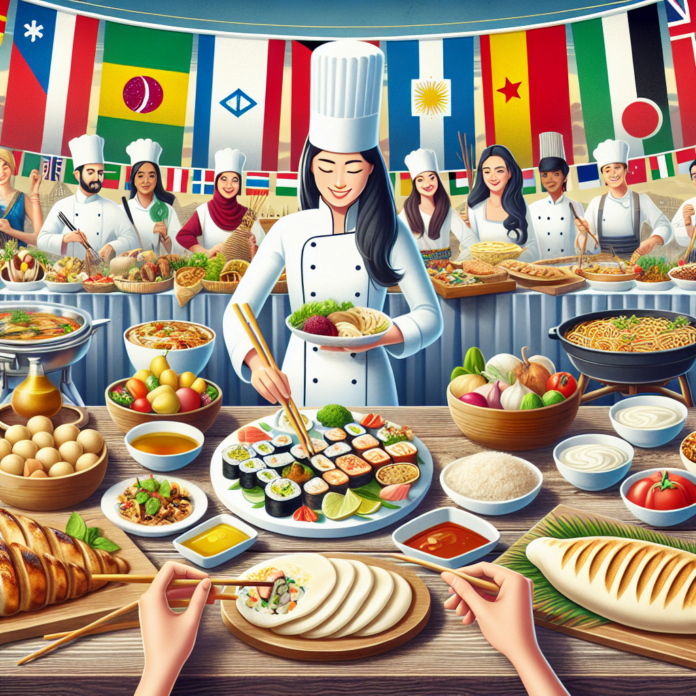Food tells a story. It paints vivid pictures of culture, tradition, and history, each dish anchored in the unique blend of flavors, aromas, and textures that elicit familiarity and home. A culinary journey through local cuisine is akin to a magical unveiling of a region’s heartbeat, unearthing the intricate mosaic of culture and tradition that resides there. As we traverse the fascinating world of local cuisines, we become active participants in an interwoven narrative of love, tradition, and cultural identity. Whether we are tasting a locally made chowder in an English seaside town or savoring a succulent Asian stir fry in a bustling market in Thailand, we’re exploring their story.
A Slice of History That’s Good Enough to Eat
Local cuisine is like a well-thumbed book, each recipe composed of carefully chosen words that, strung together, conjure an authentic expression of a specific time and place. By focusing on indigenous ingredients, traditional cooking methods, and long-standing recipes passed down through generations, local cuisines not only evoke a feeling of nostalgia but also provide a memento of historic significance.
Take, for example, the rustic charm of Italian cuisine, a vibrant showcase of the country’s rich history and cultural diversity. Each pasta shape, sauce, and cooking technique sheds light on the heritage and traditions of the region it comes from. Similarly, exploring the spicy, colorful mosaic of Indian cuisine opens up a window into a civilization dating back thousands of years.
Recounts the Land and Its Bounty
Local cuisine offers an intimate understanding of a region’s geographical characteristics and agricultural bounty. The cuisine of coastal regions often revolves around fresh seafood, while mountainous areas might feature hearty meats, root vegetables, and dairy products. Areas with a warm climate might predominantly use fresh fruits, pulses, and mild spices in their dishes, while colder regions could use a lot of preserved items, like pickles, cured meats, and hardy grains.
The cuisine of the Brazilian Amazon, for instance, demonstrates how locals have adapted their diet according to the available resources. With the Amazon River brimming with different kinds of fish, local recipes have evolved to make full use of this bounty. It tells the story of survival, resilience, and the art of making the most of what the land provides.
Highlights Cultural Exchange and Influence
Local cuisine is a testament to cultural exchange, displaying the influence of different civilizations throughout history. The multi-layered complexity of Moroccan cuisine reflects its history of being invaded or occupied by different cultures like the Arabs, Berbers, Moors, and French.
A similar blending of culinary culture is seen in the Peranakan cuisine of Singapore and Malaysia, which fuses Malay and Chinese cooking styles, ingredients, and techniques. These fusion cuisines offer a tantalizing taste of the past, showcasing centuries of cultural exchange and adaptation.
Connecting People
Finally, the magic of local cuisine lies in its power to bring people together. Sharing a meal often leads to sharing stories, fostering a connection that transcends cultural and geographical boundaries. Whether it is a festive celebration, a family gathering, or a meal shared with strangers, the experience of breaking bread together creates a sense of togetherness and camaraderie.
Regardless of where our culinary journey takes us – through the spicy street food markets of Bangkok, the quaint bistros of Paris, or the comfort food eateries of American heartland – it’s the shared experience between chef and diner that makes each dish more than just a meal. It becomes a delicious dialogue, a chance for us to listen to each other’s stories, learn from them, and find common ground, even amidst our differences.
Conclusion
Undoubtedly, the terrain of local cuisine is a captivating one, laden with tales of history, geography, and cultural exchanges that enlighten and inspire. It connects us at our most primal level, through the shared need and love for food. Embarking on a culinary journey is not only a feast for the taste buds but also an opportunity to step into a different culture, catch a whisper of their local lore, and share in the universal story of humanity. Unveiling the magic behind local cuisine is, without question, a journey worth taking.
Frequently Asked Questions (FAQs)
Why is local cuisine important?
Local cuisine is important for various reasons. It helps preserve cultural heritage and traditions, tells a region’s past, reflects the local lifestyle, showcases the local agricultural bounty, provides economic opportunities, and is central to tourism and gastronomic experiences.
What can you learn from local cuisine?
Local cuisine can offer valuable insights into a region’s history, culture, geography, and its people’s way of life. It often tells the story of the region’s colonization, migration patterns, and socio-economic changes.
How can I learn about local cuisine?
One of the best ways to learn about local cuisine is by traveling and experiencing it first-hand. If travel isn’t an option, one can read cookbooks, food blogs, watch food-themed TV shows, or participate in local cooking classes.

